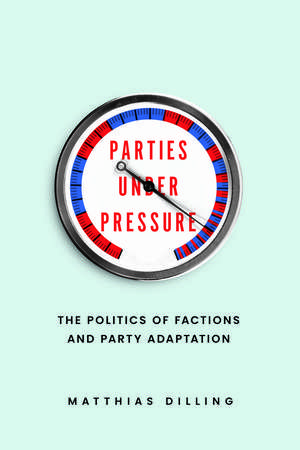Parties under Pressure: The Politics of Factions and Party Adaptation
Autor Matthias Dillingen Limba Engleză Paperback – 7 aug 2024
Around the world, established political parties face mounting pressures: insurgents on the Left and Right, altered media environments, new policy challenges, and the erosion of traditional strongholds, to name just a few. Yet parties have differed enormously in their ability to move with the times and update their offers to voters. This variation matters. While adaptation does not guarantee a party’s electoral success, the failure to modernize can spell its decline, even collapse, and create openings for radical and populist parties that may threaten the future of liberal democracy.
Parties under Pressure examines why some parties adapt meaningfully to social, economic, and political transformations while others flounder, focusing especially on the fate of Western Europe’s Christian democratic parties. Matthias Dilling reveals the under-appreciated importance of party factions. While very high levels of factionalism are counter-productive and create paralysis, more moderate levels of factionalism help parties to adapt by giving visibility to fresh groups and ideas. Dilling draws on extensive archival research in Germany, Italy, and Austria, as well as evidence from France, Japan, and beyond. Taking a comparative-historical approach, Parties under Pressure sheds new light on parties’ varying records of adaptive reforms over more than seventy-five years.
| Toate formatele și edițiile | Preț | Express |
|---|---|---|
| Paperback (1) | 200.15 lei 3-5 săpt. | +15.34 lei 4-10 zile |
| University of Chicago Press – 7 aug 2024 | 200.15 lei 3-5 săpt. | +15.34 lei 4-10 zile |
| Hardback (1) | 674.19 lei 6-8 săpt. | |
| University of Chicago Press – 7 aug 2024 | 674.19 lei 6-8 săpt. |
Preț: 200.15 lei
Nou
Puncte Express: 300
Preț estimativ în valută:
38.30€ • 39.57$ • 31.88£
38.30€ • 39.57$ • 31.88£
Carte disponibilă
Livrare economică 04-18 martie
Livrare express 15-21 februarie pentru 25.33 lei
Preluare comenzi: 021 569.72.76
Specificații
ISBN-13: 9780226830254
ISBN-10: 022683025X
Pagini: 320
Ilustrații: 20 line drawings, 24 tables
Dimensiuni: 152 x 229 x 20 mm
Greutate: 0.4 kg
Ediția:First Edition
Editura: University of Chicago Press
Colecția University of Chicago Press
ISBN-10: 022683025X
Pagini: 320
Ilustrații: 20 line drawings, 24 tables
Dimensiuni: 152 x 229 x 20 mm
Greutate: 0.4 kg
Ediția:First Edition
Editura: University of Chicago Press
Colecția University of Chicago Press
Notă biografică
Matthias Dillingis an assistant professor of politics at Swansea University. He previously taught at Oxford University and was a visiting researcher at Yale University and the University of Vienna. He received the American Political Science Association’s Walter Dean Burnham Award for the best dissertation in politics and history.
Cuprins
List of Illustrations
List of Abbreviations
Part I: Problem and Theory
1. The Puzzle: The Varying Substance and Speed of Party Adaptation
2. The Theory: Factionalism, Party Adaptation, and Multilevel Path Dependence
Part II: The Main Cases
3. Italy’s DC: Centralized Leadership Selection, High Factionalism, and Centrifugal Pressure
4. Austria’s ÖVP: Decentralized Leadership Selection, Low Factionalism, and Organizational Rigidity
5. Germany’s CDU: Mixed Leadership Selection, Moderate Factionalism, and Adaptation
Part III: Comparative Perspectives
6. Christian Democratic Adaptation beyond Italy, Austria, and Germany
7. Party Adaptation beyond Post-1990 Christian Democracy
Conclusion: Lessons for the Study of Party Adaptation, Factionalism, and Party Organization
Acknowledgments
Appendixes
Notes
References
Index
List of Abbreviations
Part I: Problem and Theory
1. The Puzzle: The Varying Substance and Speed of Party Adaptation
2. The Theory: Factionalism, Party Adaptation, and Multilevel Path Dependence
Part II: The Main Cases
3. Italy’s DC: Centralized Leadership Selection, High Factionalism, and Centrifugal Pressure
4. Austria’s ÖVP: Decentralized Leadership Selection, Low Factionalism, and Organizational Rigidity
5. Germany’s CDU: Mixed Leadership Selection, Moderate Factionalism, and Adaptation
Part III: Comparative Perspectives
6. Christian Democratic Adaptation beyond Italy, Austria, and Germany
7. Party Adaptation beyond Post-1990 Christian Democracy
Conclusion: Lessons for the Study of Party Adaptation, Factionalism, and Party Organization
Acknowledgments
Appendixes
Notes
References
Index
Recenzii
"The fate of democracy is inextricably linked with political parties. Understanding why only some parties can adapt to major change helps structure our thinking about the future of democracy. Matthias Dilling unpacks parties, focuses on party factions, and comes up with some surprising answers. An important addition to empirical democratic theory."
“In this comprehensive account of political parties as collective actors, Dilling questions why some parties adapt to changing times while others fail. Deftly combining organizational approaches to this question with a focus on party factions, Dilling sheds light on parties’ ability to manage competing forces within their own ranks, and thereby remain responsive to social change. Parties Under Pressure combines a new historical comparative analysis with important theoretical contributions, providing an insightful study of factions’ ability to work as both catalysts and breaks on party reform.”
